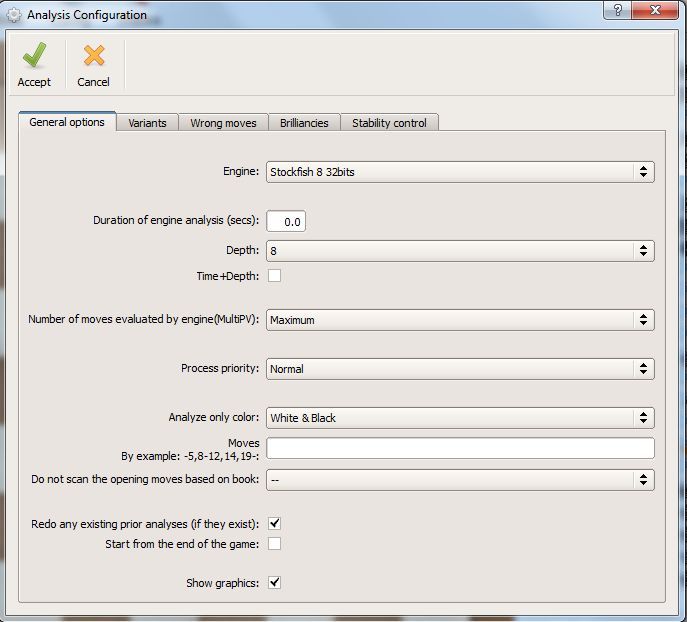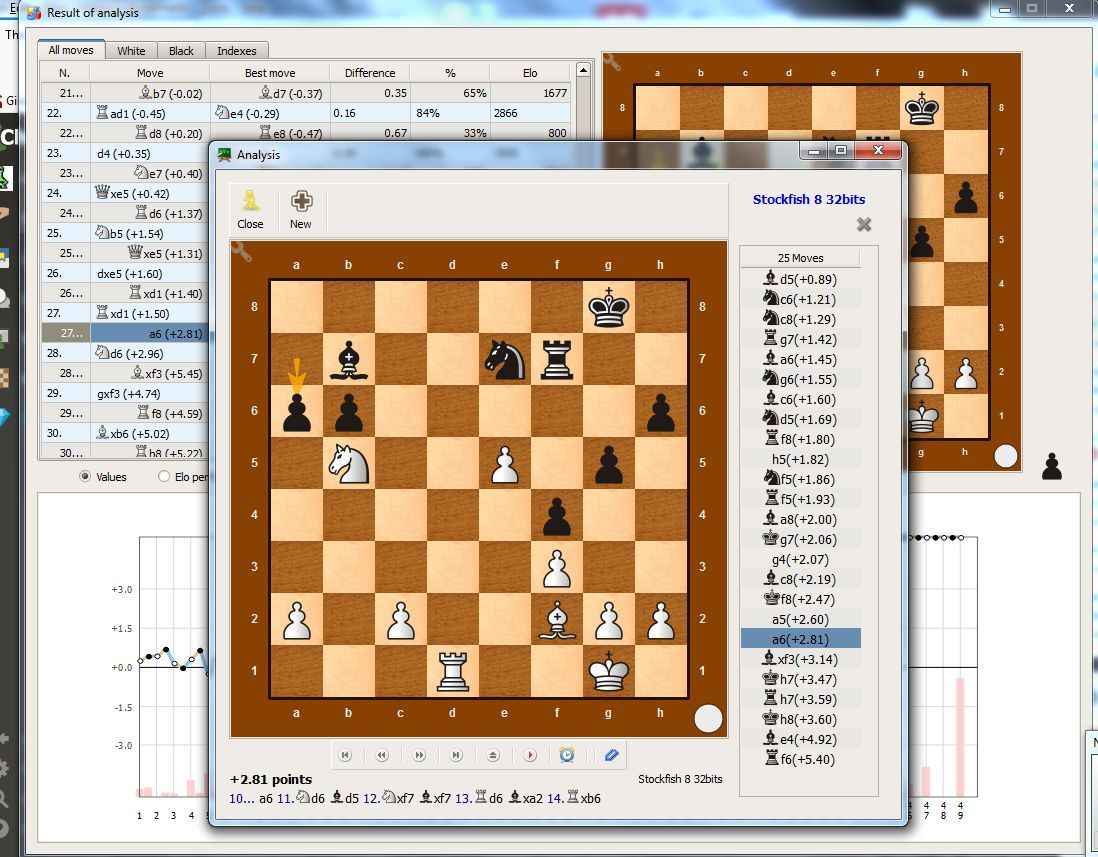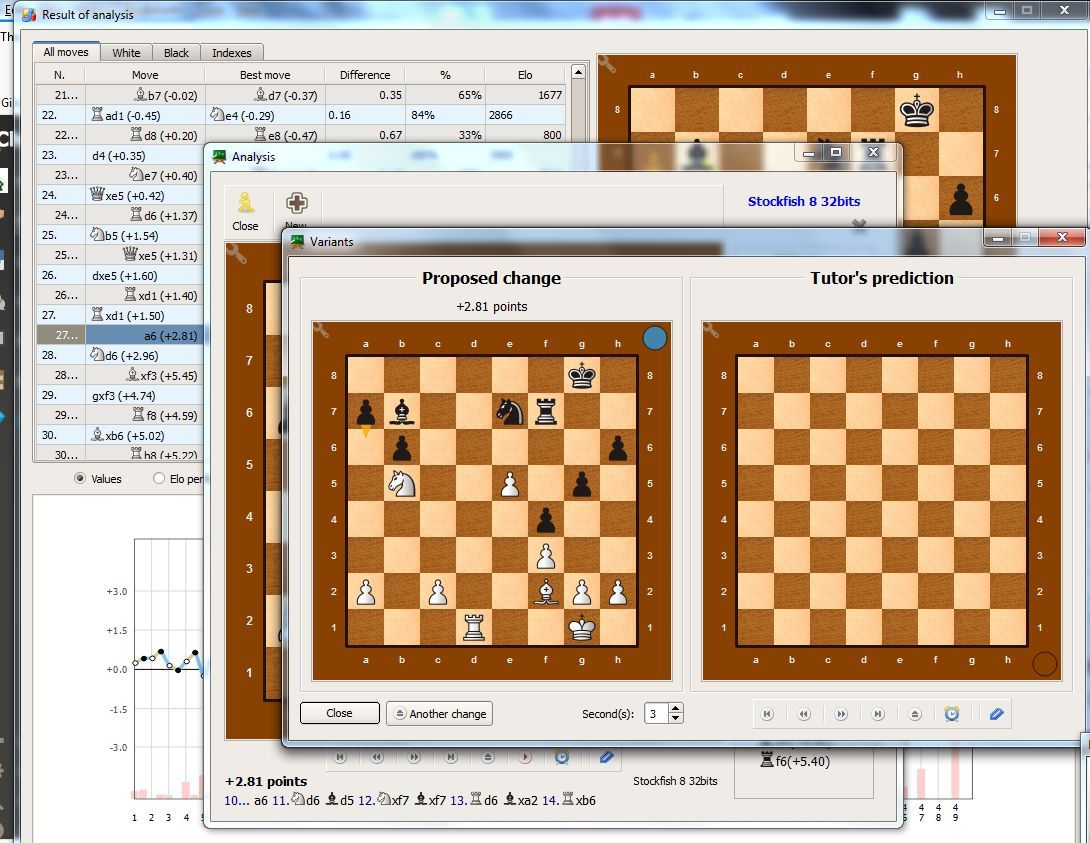The best "teacher" engine to analyze a low rated game


Hello,
I am very low rated player (elo 950 on bad days, and my very best was 1320). I try to analyze some of my games (except those with obvious mistakes) with LucasChess. But sometimes, I don’t understand why Stockfish makes some good or bad evaluation.
Then, is it a good way to analyze with the strongest engine ? I wonder if a less rated engine (2000-2500) could be a better way to understand. Fruit seems to me to be a good “teacher” engine. What do you think about it ?
IMBacon is right - You should only use engine analysis to check for blunders and missed tactics. Having said that, I think I understand what you're saying. If the engine spots a deep tactic (say, 20 plies deep, which is 10 moves deep), us mere mortals may not even be able to see or understand that deep tactic, even when the engine spits out the long tactical variation.
To solve that problem, you could try making a change or two to the LucasChess analysis "General options" just before the analysis is started. (I would continue using the Stockfish engine - There's nothing wrong with the engine, but you just need to "dumb it down" a bit.)
First, change the engine's depth to a low number of plies, say about 8 or so. Next, change the "Number of moves evaluated by engine (MultiPV) to "Maximum". The change to 8 plies will greatly shorten the variations that the engine presents to you, and hopefully, you'll be able to follow the ideas.

By the way, the LucasChess analysis feature is packed with capabilities, but they are not documented very well. After the "Result of analysis" window appears, try double-clicking your mouse on a move of interest. This will bring up another analysis window just for that move:

Now, for this move, you can use the "analysis of variant" button to further analyze the move using the help of the Tutor engine.

For this particular move in the example, instead of playing 27...a6, you can make another alternate move for Black, and the Tutor engine will give an evaluation for that move. For example, grabbing the black knight on e7 and moving it to d5 results in this Tutor prediction:


Using an engine to learn chess is like using a calculator to learn mathematics.
True. Hopefully, he's only using the engine to spot blunders. He still needs to learn from the traditional sources: books, DVDs, trainers, stronger opponents, etc. (And lots of self-analysis via blood, sweat, and tears...)

@EscherehcsE,
it seems you are pretty familiar with Lucas chess, and you are right that there are lots of good features but its all poorly documented. I am sure you are aware in the analysis feature, when you get the pop up screen showing the graph of the relative evaluation after each move, there is a tab called indexes, with a bunch of stuff I don't know the definitions for.
For example there are evaluations for complexity for each player (moderate, 23% for example), efficient mobility, narrowness, domination, etc.
Do you have any idea how these evaluations are determined?

EscherehcsE, You explained pretty well above how you can learn from an engine, so don't be so quick to agree with these nay sayers who think you can't!
To summarize, For every move you made in a game, the engine gives you list of the top moves with the evaluation number. You can click on each of those moves and run through the line the engine predicts for best play. Hopefully after seeing the line you see why it was better. If you don't think your opponent would have played those same predicted moves, you can click on "analysis of variant" and see the best line after putting in the move you feared your oppenent would have played which steered you away from a particular option.
I really see it to be not much different than a coach who tells you there are better moves, and then shows you how the better moves lead to better positions etc.
I think I have learned a lot from engine analysis.

… The only thing you should be using an engine for is to check for blunders, and missed tactics. Anything else is a waste of your time, and learning.
Are blunders and missed tactics the only topics in collections of annotated chess games?
Do most engines have a setting that causes them to only comment on blunders and missed tactics?

Using an engine to learn chess is like using a calculator to learn mathematics.
For better or for worse, it is quite common for calculator use to be considered appropriate in a math class.

... He still needs to learn from the traditional sources: books, DVDs, trainers, stronger opponents, etc. (And lots of self-analysis via blood, sweat, and tears...)
Is anyone proposing to attempt to learn chess by using an engine and nothing else?

@EscherehcsE,
it seems you are pretty familiar with Lucas chess, and you are right that there are lots of good features but its all poorly documented. I am sure you are aware in the analysis feature, when you get the pop up screen showing the graph of the relative evaluation after each move, there is a tab called indexes, with a bunch of stuff I don't know the definitions for.
For example there are evaluations for complexity for each player (moderate, 23% for example), efficient mobility, narrowness, domination, etc.
Do you have any idea how these evaluations are determined?
I've never really used those terms, but there is a document by Tumbarello that defines most of them:
https://lucaschess.pythonanywhere.com/static/pdf/english/advanced_info_%20in_LC8.pdf

@EscherehcsE,
it seems you are pretty familiar with Lucas chess, and you are right that there are lots of good features but its all poorly documented. I am sure you are aware in the analysis feature, when you get the pop up screen showing the graph of the relative evaluation after each move, there is a tab called indexes, with a bunch of stuff I don't know the definitions for.
For example there are evaluations for complexity for each player (moderate, 23% for example), efficient mobility, narrowness, domination, etc.
Do you have any idea how these evaluations are determined?
I've never really used those terms, but there is a document by Tumbarello that defines most of them:
https://lucaschess.pythonanywhere.com/static/pdf/english/advanced_info_%20in_LC8.pdf
Wow sorry I asked ![]()
That's some complicated stuff. I have searched for that info many times and never found that document, so thanks for that!
But there is some useful info in there aside from the formulas, including the definitions below. I'm glad I know what they mean (I especially wondered about narrowness), but I don't see much usefulness. The winner of a game usually has the better numbers (Less narrow, more mobility, more activity etc):
For complexity we mean a value that tells the user how difficult is to find,
in a certain position, the best move.
efficient mobility measures how forcing is the nature of the position, from the point of view of the side
with the right to move.
narrowness. This parameter tells, in our hopes, how crowded and/or narrow is a
position.
Narrowness and efficient mobility are actually enough close concepts
but not identical: by the former LucasChess shows how efficiently the
pieces occupy the board, by the latter LucasChess shows the
percentage of moves that are not forced.
we define pieces activity as the ability of all pieces belonging to a
player to generate good moves and threats.
LucasChess offers its users the possibility to take note of the different
tendency of white and black to simplification, that normally involves
captures and promotions

Using an engine to learn chess is like using a calculator to learn mathematics.
I think Wolfram-Alpha comes closer to the analogy, you will not learn math with that alone, that's for sure.

I sometimes wonder to myself if spending good time analyzing my games is even worthwhile under 1000 or whatever unless something very confusing happened during. Refining in this way feels like polishing a turd and time probably better spent doing tactics for a better improvement.

"... Review each of your games, identifying opening (and other) mistakes with the goal of not repeatedly making the same mistake. ... It is especially critical not to continually fall into opening traps – or even lines that result in difficult positions ..." - NM Dan Heisman (2007)
https://web.archive.org/web/20140627062646/http://www.chesscafe.com/text/heisman81.pdf

"... Review each of your games, identifying opening (and other) mistakes with the goal of not repeatedly making the same mistake. ... It is especially critical not to continually fall into opening traps – or even lines that result in difficult positions ..." - NM Dan Heisman (2007)
https://web.archive.org/web/20140627062646/http://www.chesscafe.com/text/heisman81.pdf
See what you mean.
I have been starting to limit it to when getting into a very bad exchange and things like that.

I sometimes wonder to myself if spending good time analyzing my games is even worthwhile under 1000 or whatever unless something very confusing happened during. Refining in this way feels like polishing a turd and time probably better spent doing tactics for a better improvement.
Analyzing your own games is probably the single best thing you can do to improve.
Do your own analysis. Dont wont worry about how right, or wrong, good, or bad your analysis is.
What were your thoughts? Ideas? plans? What were you opponents thoughts, ideas, plan?
Get someone stronger to review your games with you. If you dont have anyone to review your games with. Run your games through a chess engine, checking for blunders, and missed tactics only.

I sometimes wonder to myself if spending good time analyzing my games is even worthwhile under 1000 or whatever unless something very confusing happened during. Refining in this way feels like polishing a turd and time probably better spent doing tactics for a better improvement.
Analyzing your own games is probably the single best thing you can do to improve.
Do your own analysis. Dont wont worry about how right, or wrong, good, or bad your analysis is.
What were your thoughts? Ideas? plans? What were you opponents thoughts, ideas, plan?
Get someone stronger to review your games with you. If you dont have anyone to review your games with. Run your games through a chess engine, checking for blunders, and missed tactics only.
Thanks. Will increase my effort on that side of things then. Been thinking of joining a club in my area too.

Thanks lot for all your comments !
Beyond the analysis (obviously), I use engines to explore "bad openings", or obsolete ones (sometimes it's very fun to see what engines do around those openings), but often I don't really understand theirs choices. Then my question... ![]()

… Get someone stronger to review your games with you. If you dont have anyone to review your games with. Run your games through a chess engine, checking for blunders, and missed tactics only.
Do most engines have a setting that causes them to only comment on blunders and missed tactics? If a human strong reviewer is available, are the human comments also supposed to be restricted to blunders and missed tactics?

Actually, although I am not in complete agreement with IMBacon (on a lot of stuff), Blunders and missed tactics is most of what you get out of engine analysis of your games. Thinking of other stuff I learn from the engine, I find it useful just to click through the moves and see what the engine says are the best moves I didn't make. Over time, I start to see patterns. And basic decisions like, should I develop my light squared bishop to e2 or to d3? If my opponent pins my knight on c3, should I unpin by playing Bd2, or should I chase him away with a3?
And then, there are always a couple of positions in a game where it is complicated and I have trouble seeing how to proceed, or how to avoid losing a pawn, etc, and it is always interesting to see what the engine suggests that I should have done to deal with those binds.
Hello,
I am very low rated player (elo 950 on bad days, and my very best was 1320). I try to analyze some of my games (except those with obvious mistakes) with LucasChess. But sometimes, I don’t understand why Stockfish makes some good or bad evaluation.
Then, is it a good way to analyze with the strongest engine ? I wonder if a less rated engine (2000-2500) could be a better way to understand. Fruit seems to me to be a good “teacher” engine. What do you think about it ?